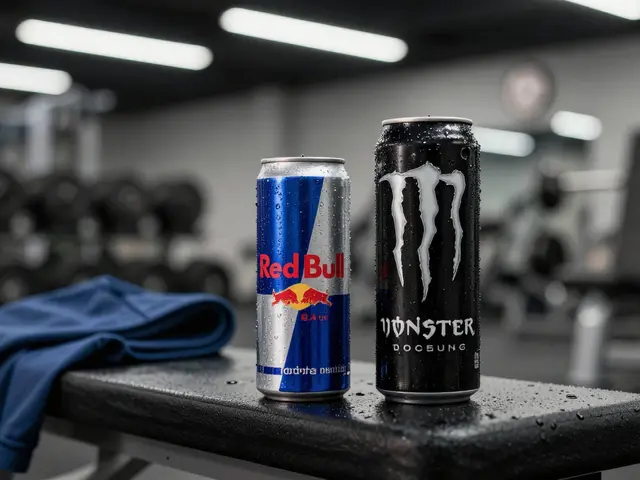Good Resting Heart Rate by Age: What to Know for Better Energy

Ever wondered if your heart is really doing its best job while you’re catching some Z's? Your resting heart rate might give you a clue. It’s kind of like a sneak peek into your overall health and fitness level. But how do you know what's 'normal' for your age? Let's break it down.
Understanding resting heart rates can actually be pretty useful, especially if you're sipping on energy drinks to keep up with life. When your heart's chillin' at its most relaxed pace, it says a lot about your general well-being.
Factors like age, fitness level, and yes, even those energy drinks you love can tweak that heart rhythm. Most adults find their resting heart rate falls somewhere between 60 and 100 beats per minute (bpm). But what should it be at different ages, and how do lifestyle choices like energy drinks play a role? Hang tight, we're diving right into it!
- Introduction to Resting Heart Rate
- Average Heart Rates by Age Groups
- Factors Influencing Heart Rate
- Energy Drinks and Heart Health
- Tips for a Healthy Heart Rate
- Monitoring Your Heart Effectively
Introduction to Resting Heart Rate
Your resting heart rate is basically the number of times your heart beats per minute while you're just chilling and not doing anything active. It’s like your heart’s baseline cruise control when you're at peace.
Why should you care? Well, it can be a solid indicator of your heart health. A typical adult resting heart rate ranges from 60 to 100 beats per minute (bpm), but it can vary depending on several factors like age and fitness levels. Generally, a lower resting heart rate means a more efficient heart function and better cardiovascular fitness. So, if you're a marathon runner or a dedicated yogi, don’t be surprised if you clock in on the lower end.
Kids typically have higher resting heart rates than adults. For example, newborns can have a resting heart rate of 100 to 160 bpm because, well, they're tiny and everything's working extra fast! As people age, the resting heart rate usually steadies down.
Factors like stress, hormones, medication, and even the occasional energy drink can influence your heart’s rate at rest. So, next time you reach for that highly caffeinated beverage, remember it might just nudge your heart rate up a beat or two!
Paying attention to how your heart performs at rest can give you some pretty valuable insights. And if you track it regularly, you might notice trends and changes that can be important for your health.
Average Heart Rates by Age Groups
So, when it comes to resting heart rates, there isn't really a one-size-fits-all answer. It varies by age and some other tweaks in your lifestyle. Let’s dig into what’s pretty typical for different age groups.
Babies come into this world with heart rates racing faster than a hummingbird—in the range of 100 to 160 beats per minute (bpm). By the time they hit toddler stage, that'll slow down a bit to about 90 to 140 bpm.
School-aged children, from about 6 to 15 years old, have a resting heart rate that usually stays between 70 and 100 bpm. Now, once you hit adulthood, that's where it starts to stabilize a bit more. Adults generally shoot for that 60 to 100 bpm range, keeping it chill.
For older adults, especially those over 65, the heart rate can sneak back up a bit. You might find it closer to the higher end, around 70 to 100 bpm, just as part of the aging process. It's all about how the body's pumping efficiency changes over time.
Here's a quick glance at average heart rates across ages:
| Age Group | Average Resting Heart Rate (bpm) |
|---|---|
| 0-1 year | 100-160 |
| 1-10 years | 70-140 |
| 11-17 years | 60-100 |
| 18-64 years | 60-100 |
| 65+ years | 70-100 |
But remember, these are just averages. If you’re an athlete or big into fitness, your heart rate could be lower, and that’s totally cool. It’s your body’s way of saying it’s in great shape. Wondering how energy drinks might play a part in this? Stay tuned, we’ll break that down next!
Factors Influencing Heart Rate
Your resting heart rate can tell you a lot about your health, but it's not a one-size-fits-all number. Several factors can tweak how fast or slow your heart beats. Some of these are expected, while others might surprise you.
Age is a major player. Generally, kids are like little energizer bunnies with higher heart rates, while adults tend to slow down as they age. This is perfectly normal and part of how our bodies evolve.
Then there’s fitness level. Ever noticed how athletes often have slower heart rates? That’s because their hearts are super-efficient, pumping more blood per beat. Basically, better fitness equals a lower resting heart rate.
Now, here’s where it gets interesting: lifestyle choices. Stuff like energy drinks can rev up your heart, thanks to caffeine and other stimulants. If you're chugging these regularly, it can temporarily nudge your heart rate up. A study from the Journal of the American Heart Association backs this, mentioning that 'caffeine and similar stimulants are known to cause a short-term rise in heart rate and blood pressure.'
"People often overlook the cumulative effect of dietary choices on heart health. Small tweaks, like moderating energy drink intake, can make a significant difference." - Dr. Emily Jenkins, Cardiologist
Don't forget about stress and sleep, either. They're like the unsung heroes of heart health. Stress can get your heart racing like you're watching your team's last-minute win, while good sleep helps it chill.
- Stress: Emotional ups and downs can bump up heart rate.
- Sleep: Quality shut-eye usually means a healthier resting heart rate.
- Medications: Some meds, including beta-blockers, can slow your heart down.
If you’re curious about how things like energy drinks or stress levels impact your heart, tracking your heart rate can be a game-changer. Keeping tabs on this can help you spot patterns and adjust your lifestyle for the better.

Energy Drinks and Heart Health
Energy drinks are like those bold friends who might seem super helpful in a pinch, but they come with quirks you need to know about. These colorful cans often contain a vibrant mix of caffeine, sugar, and other stimulants. While they promise a quick burst of energy, what do they mean for your heart rate and health?
For starters, it's pretty well-known that caffeine can spike your heart rate. A study from the International Society of Sports Nutrition highlights that caffeine-rich drinks can increase resting heart rates by about 3-7 beats per minute. It's not a huge jump but enough to make a difference, especially if you're downing these drinks regularly.
Dr. Rita Redberg, a cardiologist at UCSF, notes, "Moderation is key. While some studies show adults can safely consume up to 400 mg of caffeine per day, going overboard may lead to not-so-friendly effects on your heart."
So, how much is too much? Most energy drinks pack anywhere from 75 to 200 mg of caffeine per serving. That means it's super easy to hit or even exceed that daily recommendation with just a couple of drinks. And let’s not forget the sugar rush! Those extra sugars can lead to an initial spike, but also to a crash, affecting your energy balance.
- Listen to Your Body: That jittery feeling isn't just in your head. If you're feeling uneasy or have a racing heart after an energy drink, it might be a sign to cut back.
- Mix It Up: Instead of making energy drinks your go-to, try to include other energy-boosting options, like a quick walk or a healthy snack, to keep your heart health in check.
Balancing energy drinks with the demands of your lifestyle is key. Keep an eye on how much you're consuming and be mindful of its impact on your resting heart rate and overall well-being.
Tips for a Healthy Heart Rate
Keeping your heart humming along smoothly is easier than you might think. A few simple habits can seriously help lower your resting heart rate, making you feel healthier and more energetic.
First up, get moving! Regular physical activity strengthens the heart, making it more efficient at pumping blood, which often means a lower resting heart rate. Aim for at least 150 minutes of moderate aerobic exercise, like brisk walking or cycling, each week.
Breathing exercises aren’t just for meditation gurus. Taking a few minutes to slow your breathing and relax your mind can actually reduce your heart rate. Try inhaling deeply for a count of four, holding for four, and then exhaling for four. Repeat this a few times daily.
- Stay hydrated: Water keeps your blood flowing smoothly and can prevent your heart from working too hard.
- Sleep well: Quality sleep is crucial. Without it, your heart rate can creep up, and you’ll feel sluggish.
- Cut down on stress: A little stress is okay, but chronic stress is like a weight on your heart. Find what helps you relax, whether it’s music, reading, or just some quiet time.
- Balanced diet: Eating heart-friendly foods like fruits, vegetables, lean proteins, and whole grains can make a difference too.
And let's not forget those energy drinks. While they might give a quick boost, sipping them too often can ramp up your heart rate. Try swapping them for natural energy boosters like nuts or fruit!
A good way to monitor changes is by checking your heart rate regularly. Many smartwatches now offer heart rate tracking, giving you insights right from your wrist. Keep an eye out for any major changes and chat with your doctor if something seems off. Your heart's one of your biggest support systems, after all!
Monitoring Your Heart Effectively
Keeping an eye on your heart rate is easier than you might think, and it can offer vital insights into your health. Whether you're sitting back during your downtime or pushing through a workout, knowing your heart's rhythm can help you make smarter health choices.
Firstly, let's talk gadgets. There are plenty of smart gadgets out there designed to track your resting heart rate. Smartwatches and fitness trackers are super handy. They're like having a little coach right on your wrist, buzzing with tips on staying healthy.
But if you're old school or just like to keep things simple, you can check your pulse the manual way. Here's a quick guide:
- Sit down and relax for a few minutes, getting as chill as possible.
- Using your index and middle fingers, find your pulse on the underside of your wrist or the side of your neck.
- Count your heartbeat for 30 seconds and multiply by two to get your beats per minute.
Another neat trick is using your smartphone. Lots of apps can help you monitor your heart rate, often using your camera and flashlight. They're pretty accurate, easy-to-use, and won't break the bank.
So, why does this matter? Well, being aware of how your heart reacts to different situations, like after that energy drink you just had, can keep you in the know about your stress levels or how your body's handling caffeine.
Remember, while gadgets and apps give great data, it's all about the bigger picture. Check your heart rate regularly, look for unusual trends, and chat with a healthcare pro if you're ever unsure. A healthy heart rate is more than just a number—it's a real-time update on how you’re doing.






Comments (10)
Sandy Pan
18 Jul 2025
This topic on resting heart rates by age truly unveils how deeply connected our physical state is with our broader existence. When I think about energy, it's not just about being alert or awake, but about the harmony within the body—that rhythm our heart keeps as a constant reminder of life itself.
Did anyone else find the part about energy drinks and their effect on resting heart rate intriguing? It seems almost paradoxical how something meant to boost energy can potentially disrupt that delicate balance.
It makes me reflect on the balance between pushing ourselves and allowing ourselves to simply be. Maintaining an optimal resting heart rate feels like finding that middle path—not too fast, not too slow.
Does anyone here actively monitor their resting heart rate? How has that changed your approach to health or energy?
Ultimately, it's a fascinating blend of science and philosophy, reminding us that understanding our body better can lead to profound transformations in how we live.
Kendall Storey
21 Jul 2025
Not to beat a dead horse, but resting heart rate is a prime biomarker for aerobic fitness & cardiac efficiency. If your HR is on the low side, typically that signals your heart pumps more blood per beat, so it doesn’t have to beat as frequently. This means better stamina and enhanced output during physical activity.
Now, about energy drinks - yeah, they spike heart rate, but usually it's a temporary blip. Still, chronic overuse can desensitize your system and stress your heart over time. Hydration and balanced stimulant intake are key. Also, tracking trends over time beats just obsessing over a single reading.
Curious if folks use wearable tech for real-time monitoring? It’s wild how accessible this info is nowadays. Combining heart rate with VO2 max & HRV (heart rate variability) metrics can give a comprehensive health snapshot.
Anyone here combining these measures to fine-tune training or lifestyle choices? Let’s hear your experience.
Ashton Strong
24 Jul 2025
This discussion is a fantastic reminder of the importance of individualized health metrics. Resting heart rate varies across individuals and as we age, natural physiological changes occur, but it doesn’t always necessitate alarm.
A good resting heart rate is generally between 60 and 100 beats per minute for adults, but athletes can have rates as low as 40 bpm, which is perfectly normal for them. It’s essential to contextualize numbers within the bigger picture of lifestyle and overall health.
On a practical note, combining regular monitoring with proper hydration and moderated stimulant consumption can greatly enhance energy levels over both short and long terms.
As an expert, I always advise patients to focus on consistent lifestyle choices rather than fixating on occasional spikes or dips.
How many here have experienced improvements by adjusting diet, exercise, or hydration based on their heart rate insights?
Rae Blackburn
26 Jul 2025
Ok but has anyone really thought about how these "average" rates might be hiding a bigger story? Like, what if the push to optimize heart rates through energy drinks or constant monitoring is just another way to control our bodies? 😳
They say moderation but what about the chemicals in these drinks? Are we slowly just building up an addiction masked as energy? I’m starting to feel like these tips are just a band-aid, keeping us dependent on stimulants while ignoring deeper problems.
Also, who decides what a 'good' heart rate is? Is there some hidden agenda to normalize certain numbers while pathologizing others? Just throwing it out there 🤔
Anyway, needed to say that. Anyone else feel like the wellness industry might be selling us a curated version of ‘health’ that benefits someone else more than us?
Yashwanth Gouravajjula
28 Jul 2025
Interesting points raised, especially about the energy drinks and their impact on heart rate. From a cultural perspective, energy boosters have always had different meanings. In India, natural remedies and herbal tonics are preferred over synthetic stimulants.
Also, resting heart rates differ not only with age but can be affected by environmental factors like altitude and diet, which vary widely across regions.
It is fascinating to see how global perspectives on health markers such as heart rate can inspire tailored interventions rather than one-size-fits-all solutions.
Does anyone have experience integrating traditional methods alongside modern biometrics to manage their heart health?
Aafreen Khan
29 Jul 2025
LOL I don't trust these 'average' numbers at all like what if they just make us normal so they can sell more pills or energy drinks 🤡 plus they don't mention how these energy drinks have like crazy chemicals that mess with your heart for life
People think they're helping but really just getting addicted. I always say natural is better but y'all do what u want. Bet they don't tell you the whole truth cuz they want profit 😊
Anyway, has anyone tried cutting out caffeine and energy drinks completely? How long till your heart rate chill out?
King Medoo
30 Jul 2025
I find it imperative to emphasize the ethical responsibility we have in interpreting our health metrics — especially something as personal as resting heart rate. It is not merely a physical measure but a barometer of our moral stewardship over our bodies.
Consider the overconsumption of stimulants which leads to disrupted physiological harmony. The systemic neglect in foreseeably worse health outcomes is not just a personal flaw but a societal challenge that must be acknowledged.
Even as emoji enthusiasts rejoice in sharing their health statuses, let's remember the deeper contemplations on well-being and self-care that transcend mere numbers or casual monitoring.
🌿💪🏼 Let’s champion true wellness rather than superficial fixes 🕊️
LeVar Trotter
1 Aug 2025
Adding a note here as someone who mentors folks about holistic health monitoring — resting heart rate alone, while useful, shouldn’t be viewed in isolation. It interacts with many variables like stress levels, sleep quality, and even emotional well-being.
Moreover, interpreting changes requires nuanced understanding; an occasional spike might be perfectly normal during anxiety or after caffeine.
Implementing regular tracking, paired with lifestyle adjustments and possibly consulting healthcare providers, ensures responsiveness rather than reactive panic.
Has anyone here utilized multidisciplinary approaches incorporating heart rate data to improve quality of life? Would love to hear your case studies or success stories!
Tyler Durden
4 Aug 2025
Great thread so far! Quick question: How do you all differentiate between a healthy variation in resting heart rate and a sign of something potentially worrying? Because sometimes, like when I'm stressed or after some intense days, my heart rate can vary quite a bit.
Also, are there any energy drinks that you think are less damaging compared to others? I’m trying to reduce my caffeine intake but still want a little boost now and then without wrecking my system.
Appreciate all perspectives here—keen to learn what works for others and what science says about these nuances.
Pamela Watson
13 Aug 2025
Honestly, I check my resting heart rate with my phone sometimes and I guess it helps me keep track of how tired I am. But mostly it tells me when I shouldn't have an extra coffee or an energy drink. ☕️😅
It's kinda fun too to see how it changes after exercise or even just chilling out watching TV.
Anyone else have weird resting heart rate numbers? Like mine can be 55 but some days it’s 90 - guess that means I need to chill more haha.
Also, what drinks or habits really helped y’all improve energy without messing with your heart? Nothing too fancy please, just some real talk tips :)